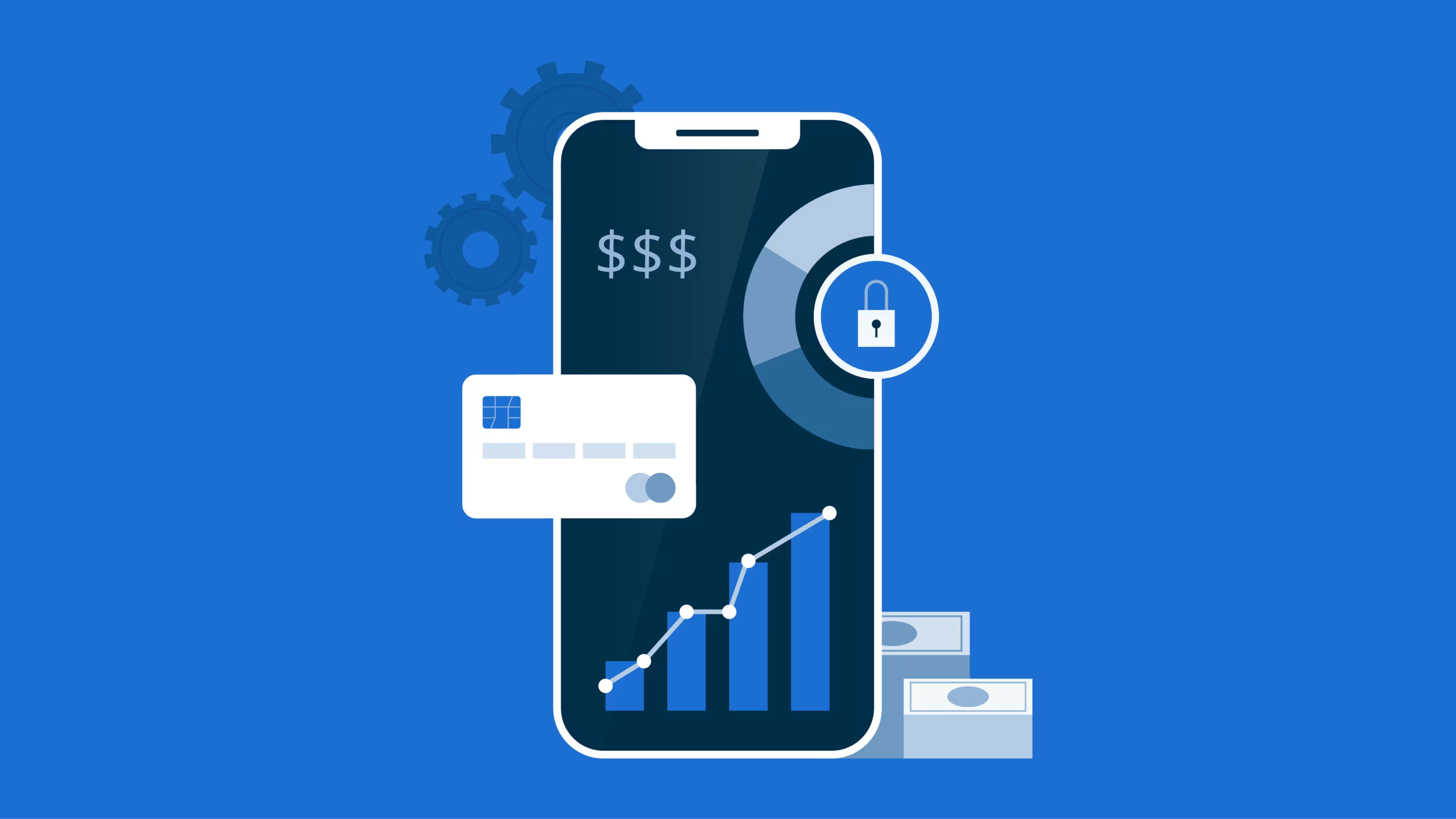45% of consumers say fintech could make working with a financial professional obsolete.
Financial technology—commonly referred to as fintech—is becoming more and more consumer-oriented every day. From mobile apps that let users invest with a single tap to easily accessible educational websites built around financial literacy, consumers have more resources than ever to handle their financial needs.
As fintech becomes more popular, it’s changing consumers’ reliance on financial professionals. In fact, in a recent Capterra survey*, 60% of surveyed fintech users seek advice from fintech solutions before consulting their accountant or financial advisor, and 64% feel that these tools have significantly reduced their need to interact with their financial advisor in general.
If you’re an accountant, you might feel like fintech could be the death knell of your profession. But the solution is to embrace the technology, not fight it.
Highlighting what fintech users like about the technology and where they feel it falls short, our analysis showcases how working with—rather than against—the technology can make you a stronger advisor and complement the financial services you already provide.
/ Key findings
48% of consumers currently use fintech apps. Fintech is especially popular with younger generations (Millennials and Gen Z).
73% of fintech users actively use between 2 to 5 fintech solutions or personal finance tools, coveting the convenience these solutions provide with user-friendly interfaces and data visualization tools.
89% of users say that they’ve encountered challenges when using fintech, citing security concerns, hidden costs, and limited functionality.
The most popular fintech solutions are banking (82%), payment (63%), and personal finance management (57%) tools.
Though 64% of fintech users say that these tools have reduced their reliance on working with a financial professional, 57% of users share that they still need—and prefer—accountants to handle complex financial tasks such as tax preparation.
What is fintech?
Fintech is an umbrella term that encompasses mobile applications, computer software, and other digital technologies that aim to enhance and automate traditional financial services for consumers. Fintech is often designed to be user-friendly and can streamline everything from paying bills to investing.
Fintech is favored by younger generations and defined by convenience
Overall, 48% of consumers are active fintech users. Fintech has empowered consumers with new, accessible ways to manage their finances, and 73% of fintech users say that they actively use between two to five solutions to handle various financial needs.
Fintech is especially attractive to Millennials and younger generations, who eschew time-consuming and traditional methods of financial management, such as physically visiting a bank or conducting paper-based transactions, in favor of speedy services that prioritize the user-experience.[1]
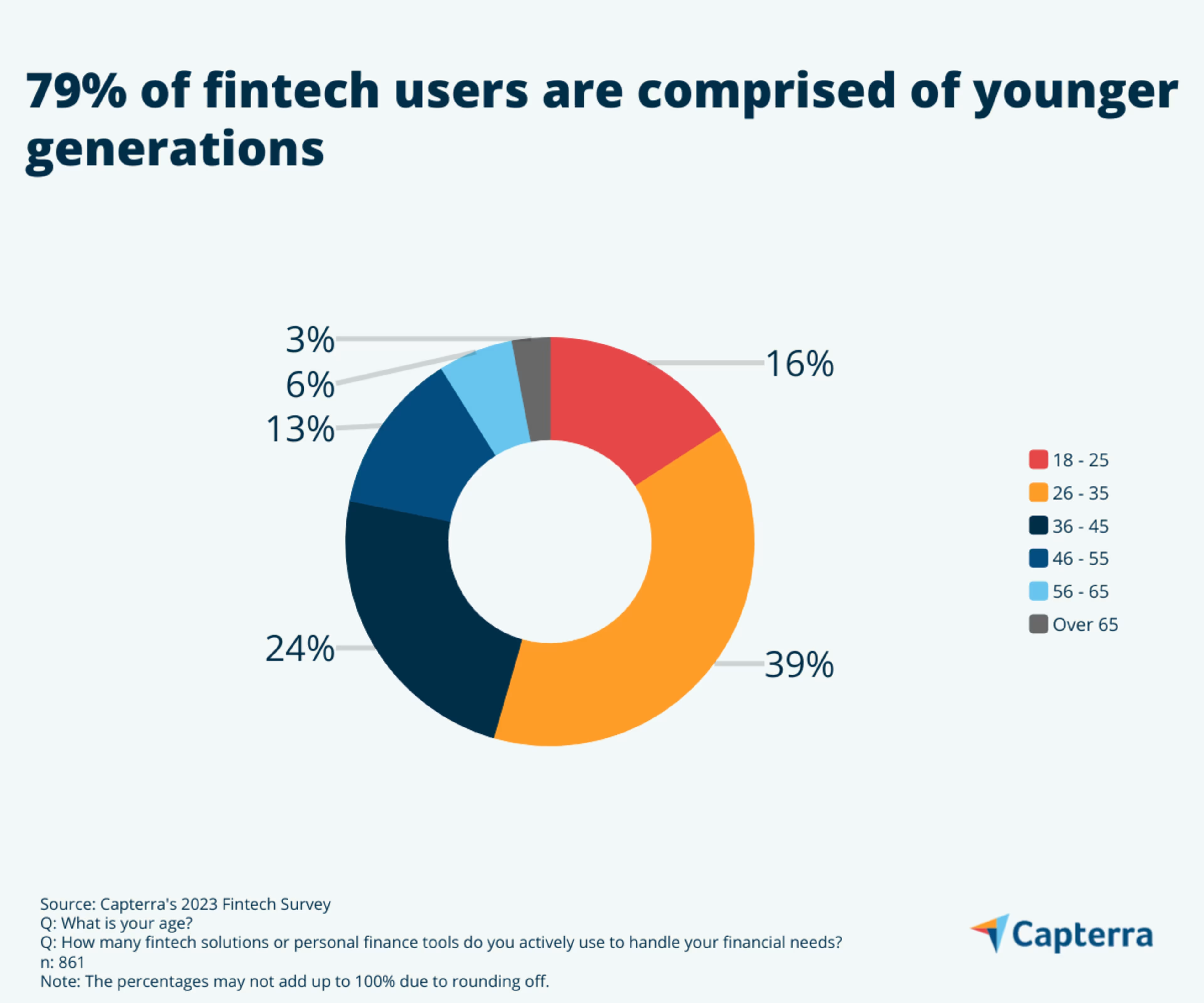
User-friendly interfaces, data visualization tools, and push notifications or alerts are among the top features that respondents find most useful, highlighting the idea that convenience is priceless to users when leveraging fintech solutions.
Beyond convenience, users say the top benefits of using fintech include saving time, feeling more knowledgeable about their finances, and reducing their overall financial stress. Curiously, while saving money was another highlighted benefit, 29% of fintech users are admittedly unsure of how much money they actually saved using these tools over the past year.
In a modern age characterized by a face-paced, digital lifestyle, convenience is king. People no longer need to spend hours in a slow-moving line to present hard-copy documents and identification to open a bank account. Now, it's as simple as logging into a fintech app or navigating to a provider’s website.
Fintech users point to challenges and concerns
While fintech solutions have rapidly advanced, becoming increasingly popular and notably more convenient over the last decade, this doesn’t mean users view the technology with rose-tinted glasses—89% of fintech users say they’ve encountered challenges while using these solutions, and the faults of the technology shouldn’t go unnoticed.
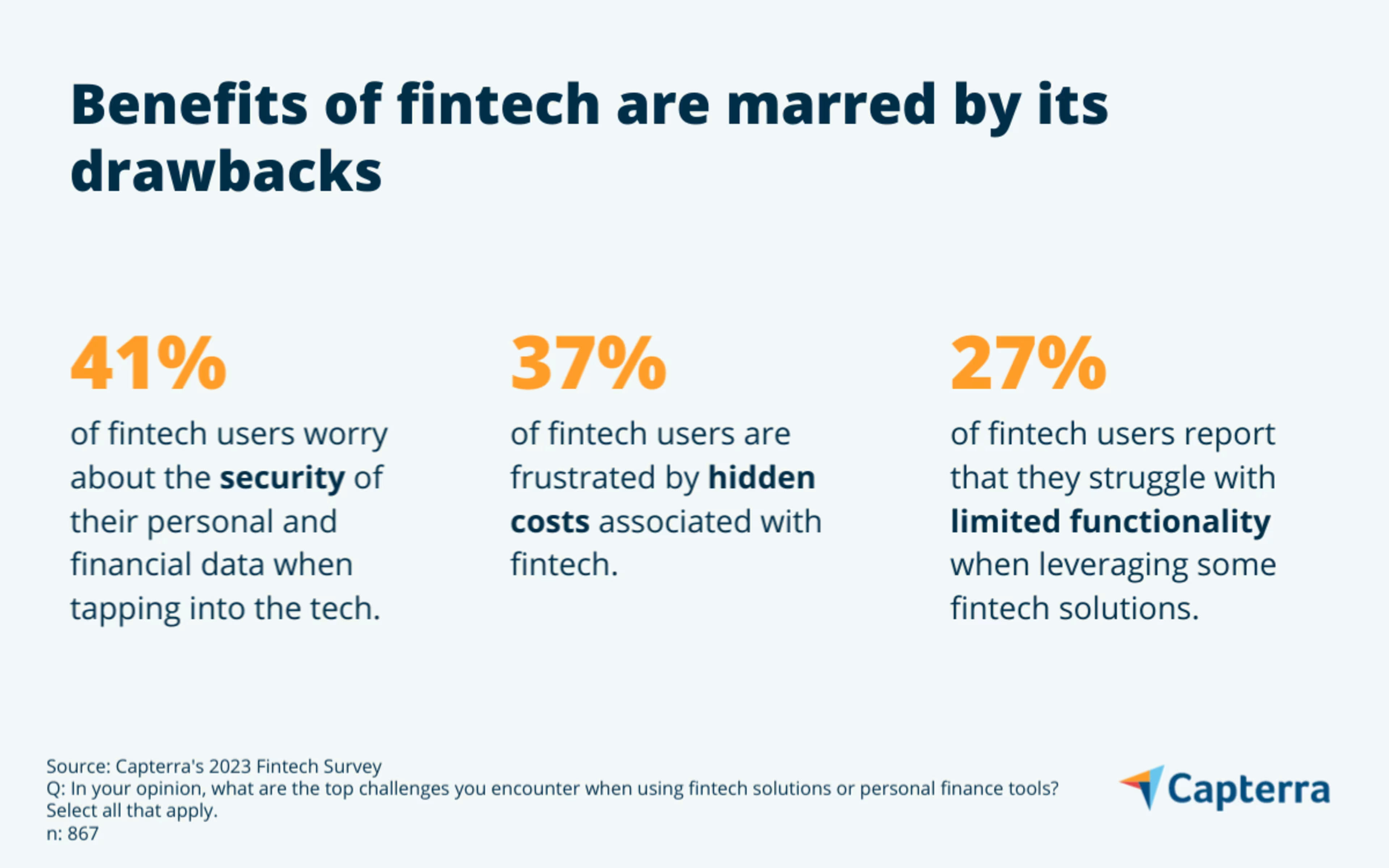
Though 64% of respondents feel somewhat comfortable sharing their personal and financial data with fintech tools, security still remains their biggest concern. Data breaches and cyberattacks are on the rise. Fintech solutions that offer a broad range of financial services put users at the most risk, as the interconnected nature of multiple accounts and financial records exposes them to more danger than a specialized solution would.
Unfortunately, specialized solutions also still carry security concerns, and their fragmented nature can be inconvenient for users, forcing them to switch between apps and navigate across various interfaces to cover their financial needs.
Limited functionality or technical issues are other hindrances that users identified, followed by navigating hidden costs—such as transaction, overdraft, or account closure fees.
3 ways accountants can deliver on the compelling aspects of fintech
Despite the challenges that fintech users cite, these tools have allowed them to manage their finances with more agency, changed the way they stay educated on financial trends, and impacted their view of which services accountants can best provide.
Here are three ways your accounting practice can deliver on the compelling aspects of fintech, while also playing to your specific strengths as a financial services provider.
1. Offer convenient, digital services to keep clients up to date on financial trends
Sixty percent of fintech users say that they frequently seek advice from these solutions or other personal finance tools before consulting with their accountant or advisor, likely due to the fact that fintech solutions provide guidance in real-time based on trends gleaned from users’ collected data or through alerts and notifications based around their financial goals. Only 11% of users say that they’d prefer to receive guidance from their financial advisor in-person, and 40% of fintech users say they gravitate toward digital counsel.
In addition to fintech, users are turning to educational websites, podcasts, news sources, and even blogs as their primary sources of financial advice. Free digital resources have become the new touchpoint for financial analysis and the latest financial trends.
Fintech users say that they need guidance when it comes to complex areas of finance, such as preparing their taxes, and especially when it comes to investing, saving, or other financial topics that concern wealth management. When asked which emerging financial tech they are most interested in, users identified cryptocurrency, blockchain, and digital exchange platforms, all of which are components of the investment landscape.
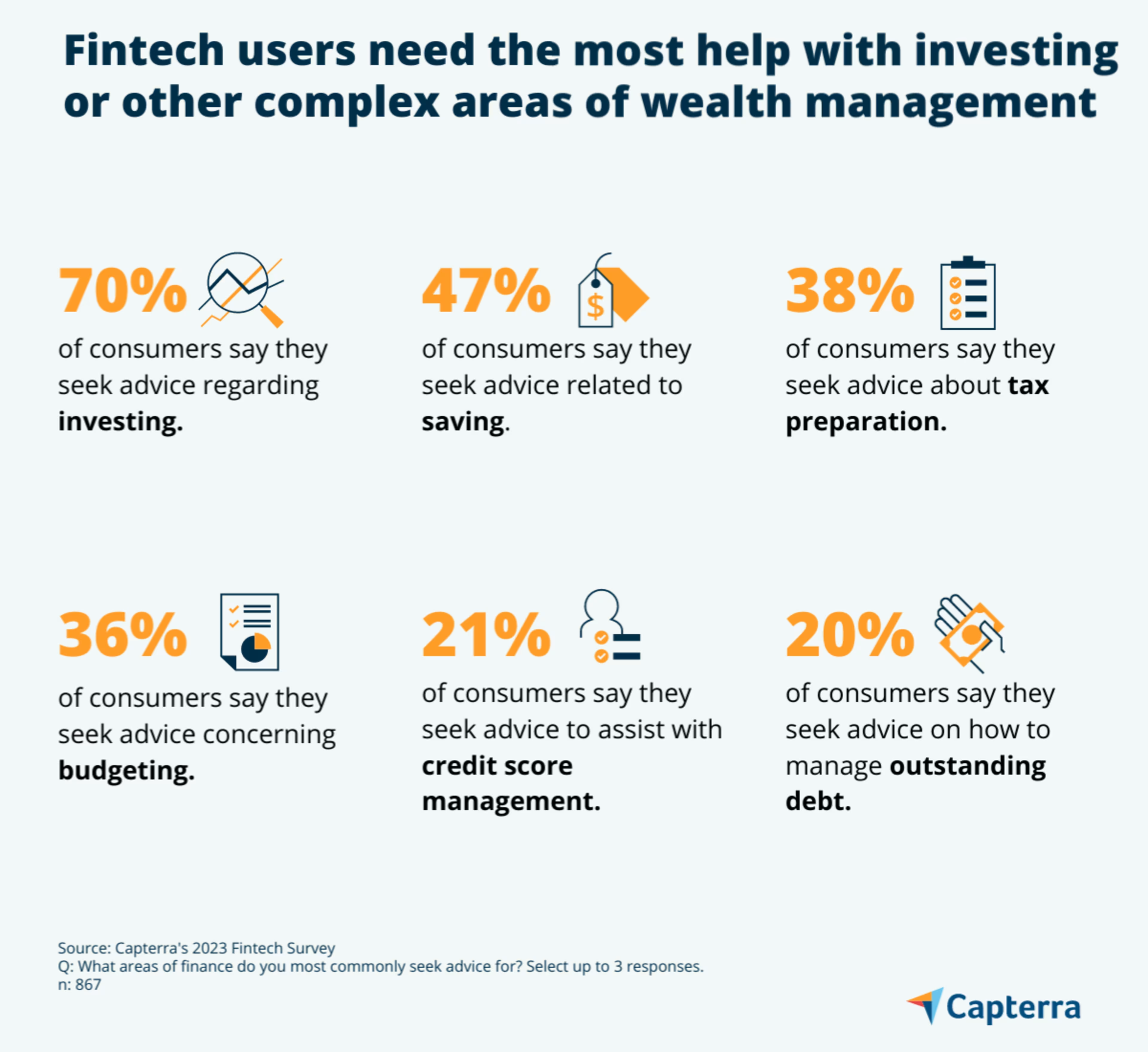
/ Our recommendation
You should strive to become your clients' primary source for financial advice and trend analysis. Given fintech users’ preference for virtual assistance, offer virtual advisory services and generate resources that fit into digital formats. Consider creating a newsletter that covers trending topics—such as how cryptocurrencies are now considered commodities and securities—and ensure that you’re proactively offering analysis that extends beyond just sharing the news.[2] Taking a proactive stance by penning your own blog or sharing resources you trust showcases that you’re invested in helping your clients learn about important areas of finance and relevant developments in the field, and it makes them much more likely to actively turn to you for advice in the future.
2. Encourage clients to use tech you trust to empower them to take more control of their finances
Fintech users have more options than ever before to empower them to take a more active role in managing their finances, but interestingly enough, only 11% of respondents say that their accountant has encouraged them to adopt fintech solutions to handle any of their financial needs.
Solutions that assist with everything from budgeting to investing are just an app away, and overall, 47% of users relay that fintech has helped reduce the stress associated with their finances in general.
Fintech solutions often focus on one specific service, and for users, the most coveted application of this technology is digital payments. Since the pandemic, cashless payments have been on the rise, and more than half of respondents report using payment tools to do everything from quickly sending funds to friends to making online purchases. Payment tools that offer installment plans like buy now, pay later or bundle in rewards programs can be solid recommendations for clients to use, as these solutions provide an accessible alternative for users to build credit and foster healthy spending habits via alerts and recommendations.
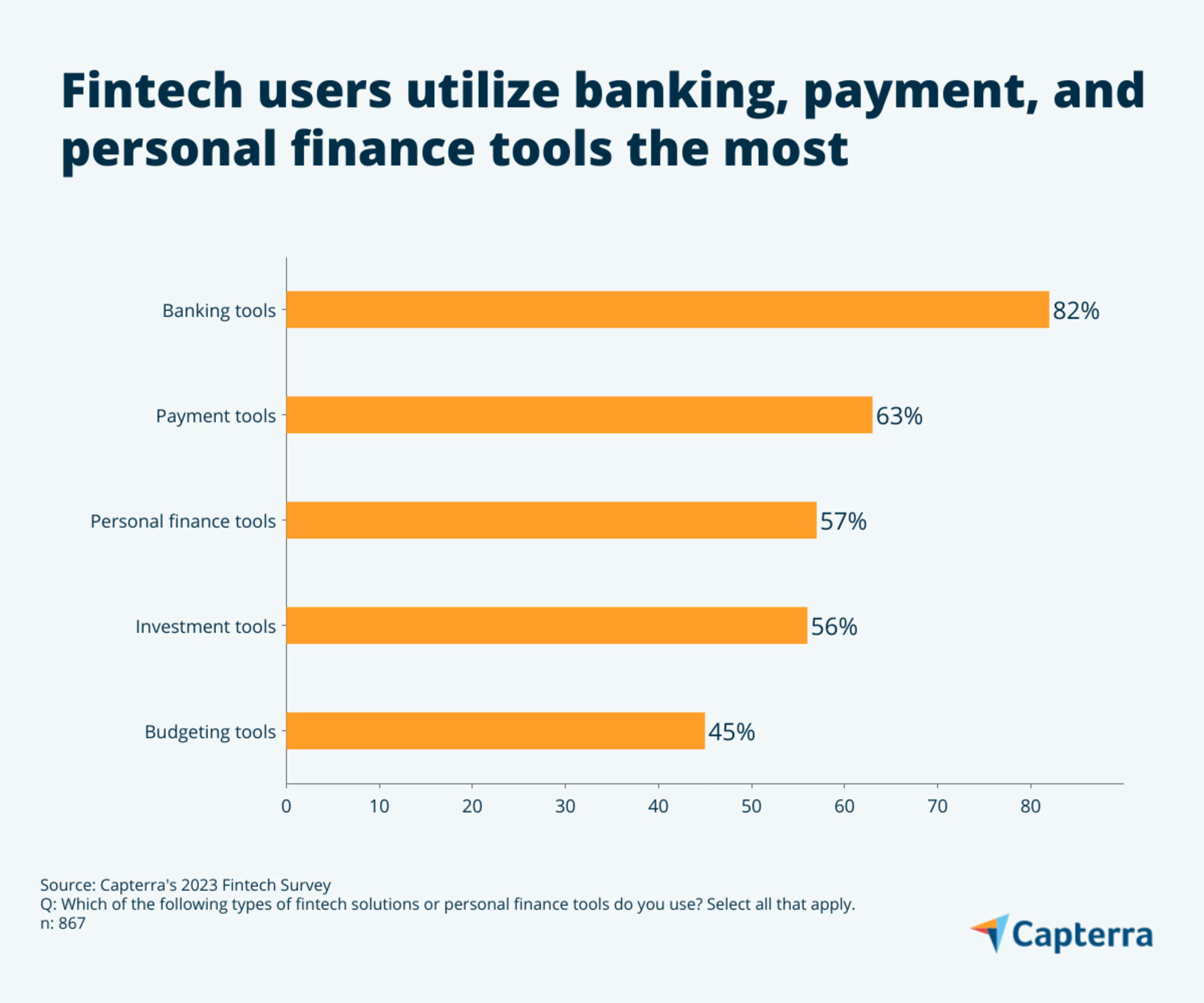
With that said, banking tools reign supreme—82% of fintech users harness these solutions. They are usually offered by financial institutions rather than a third-party provider. Accounting professionals shouldn’t hesitate to recommend banking tools, as they give users a broad array of ways to manage their finances and feature user-friendly design, readily-available customer support, and the strongest safety and security features around. Like payment tools, these solutions can enable users to transfer funds, but they also let them pay bills, locate ATMs or bank branches, check their deposits, and, in some cases, even invest directly from the platform.
/ Our recommendation
Don't shy away from encouraging your clients to adopt fintech. The convenience these tools offer comes with a wide range of benefits for everyone involved, such as streamlining tedious processes like document sharing or giving users real-time insights into their finances. Beyond making collaboration more convenient for both of you, these tools also endow users with more agency over their finances and can be easy entry points into exploring investing or personally managing their budget. Data generated from their activity can help you keep better financial records, while also enabling you to identify trends and provide guidance in real-time. Research and due diligence are essential here. Only recommended apps that meet data protection requirements, and point your clients toward technology that is backed by a reputable financial institution.
3. Market your specialized services as secure solutions for clients' financial health
Overall, one third of fintech users admit that they don’t currently have a relationship with an accountant or financial provider. For those that do, 64% say that these tools have significantly reduced their need for working with a financial professional.
While this might be alarming to read at first glance, accountants shouldn’t lose hope—57% of users say that, while they do prefer to use fintech to handle routine financial tasks such as budgeting, they still rely on their accountant to handle more complex and nuanced services. These preferences highlight the fact that, while fintech solutions can provide generalized assistance with things like financial advice, they lack the power to supplant financial professionals in comprehensive and complex areas of finance that need a nuanced approach to handle, without risk of penalties or legal issues.
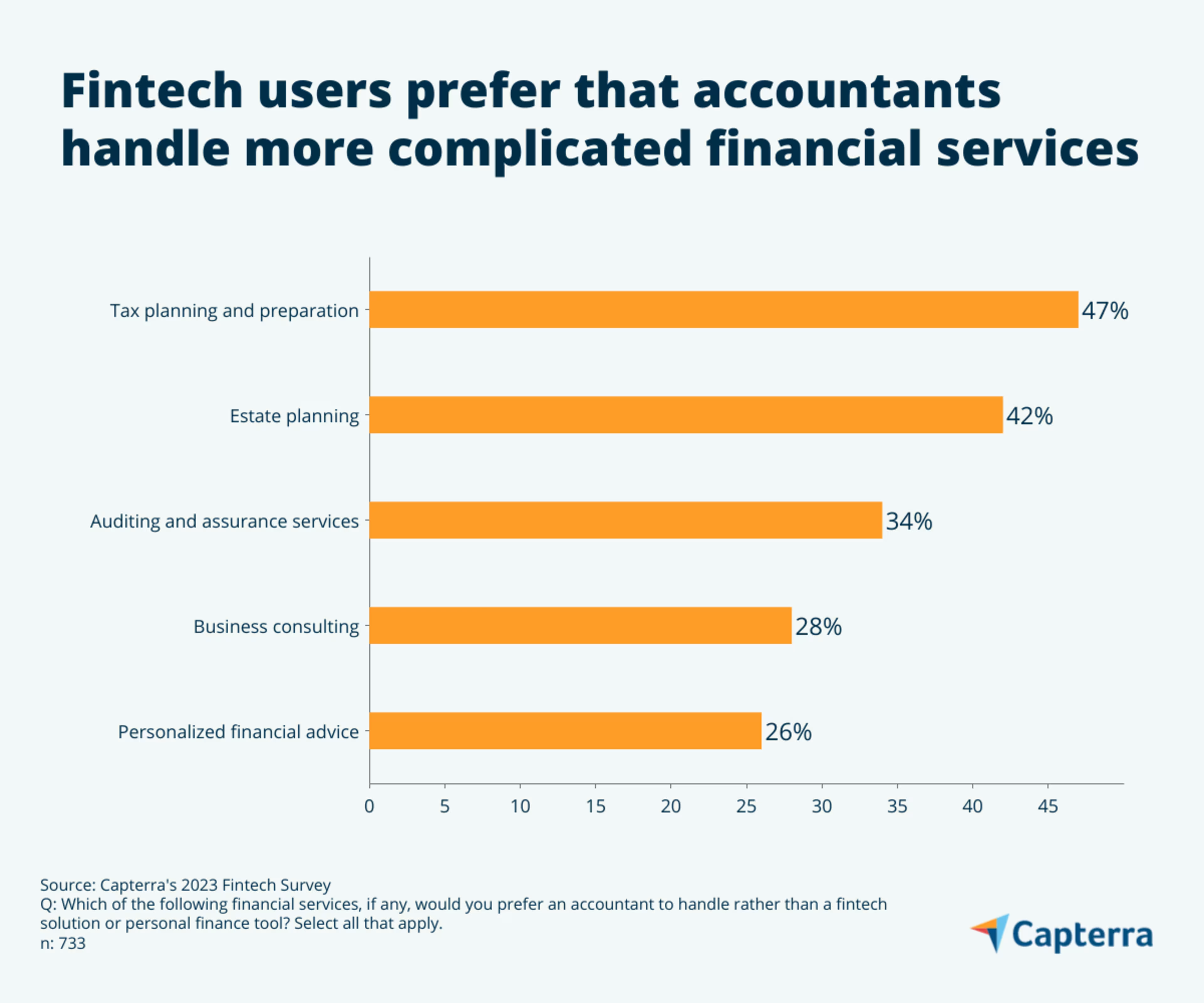
Respondents note that they would especially prefer an accountant to handle endeavors like tax preparation (47%), estate planning (42%), or auditing and assurance services (34%)—all things that require up-to-date knowledge on laws, professional standards, and the regulatory landscape to assist with in good faith.
/ Our recommendation
Though you should highlight the benefits that fintech brings your clientele, you also shouldn’t shy away from sharing its limitations. Market the fact that your specialized expertise and knowledge is the safest bet for your customers when it comes to handling complex financial tasks, and, with tact in mind, communicate how fintech solutions are neutral parties that, unlike fiduciaries like yourself, aren’t legally and ethically bound to serve users’ best interests when it comes to matters of finance. Establishing these standards can give clients a grounded perspective on where fintech can be most useful in their lives and also underscore your dedication to keeping their prosperity at heart.
Develop in lockstep with fintech so that you can face the future with confidence
As the capabilities of fintech evolve, so will consumers’ approach to handling their financial needs. Embracing the technology—while also playing to your strengths as a financial professional—can help you adjust to fintech users’ need for convenience and ensure that they’re getting assistance with complex tasks that fintech isn’t quite ready to handle.
Here are other some other ways you can effectively and proactively deal with fintech’s impact on traditional financial services:
Continue to develop professionally: Pursuing certifications, attending workshops and conferences, and participating in educational programs centered around new technologies, industry updates, and related regulatory trends can equip you with the knowledge to face fintech disruption head on.
Relay the risk and rewards of fintech: Educating your clients about the pros and cons of fintech can help build trust and ensure they understand how to best leverage the technology while making informed decisions.
Network to innovate: Connecting with and potentially partnering with established fintech providers can streamline adopting fintech into your services and also provides you with a mainline into innovative financial solutions.
To get you started on the right path, you can check out some of the top trends that will define the industry this year and explore how emerging fintech solutions have been transformative for underserved communities.

